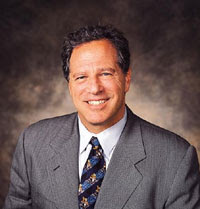
The private stem cell lobbying group controlled by
Robert Klein, who is also chairman of the state of California's $3 billion stem cell agency, has launched a major campaign to kill legislation aimed at ensuring affordable access to therapies financed by the agency.
The group is
Americans for Cures, which
denies that it engages in lobbying. Klein (see photo) is its president, a very unusual position for a top government official. Americans for Cures shares the same address as Klein's real estate investment banking firm in Palo Alto, Ca.
Via the Internet, the group is marshalling patient advocates and stem cell research backers to write, phone, email and personally appear in Sacramento to defeat the legislation. Sample scripts are provided along with names, phone numbers and email addresses of lawmakers.
Its email message to supporters says:
"We need you to take a few minutes to help save the California Institute for Regenerative Medicine and embryonic stem cell research in California. This is under siege right now in the state legislature."
Americans for Cures is targeting
SB 1565 by
Sens. Sheila Kuehl, D-Santa Monica, and
George Runner, R-Antelope Valley. It sailed easily through the
Senate and comes before the
Assembly Appropriations Committee on July 16. No state lawmaker has voted against it.
Assuming the bill clears the committee next week, it then faces
Assembly floor action and would return to the Senate for concurrence in Assembly amendments before going to the governor for his signature, which is by no means assured.
Also linked to the Americans for Cures effort is patient advocate
Don Reed of Hayward, Ca., who is vice president of the group. Reed has appeared personally in the Capitol to oppose the bill, but says he is doing so as a private individual. Reed is also one of the most regular attendees at
CIRM's public meetings, testifying on almost every occasion.
Reed wrote recently on his blog,
stemcellbattles.com, that passage of the bill is a retirement "gift" by lawmakers to Kuehl, who is barred from running again for legislative office because of term limits. Reed said that personally he regards passage of the measure as akin to "getting an arm chopped off in a sword battle."
Klein's private political activities and lobbying efforts fouled relations with the legislature as early as 2005. At one point, CIRM directors moved the agency's legislative unit out from under Klein's control. Relationships improved, but Klein now has a firm grasp on the agency's dealings with lawmakers.
Activities of Klein's group have also lead to public confusion about its relationship to the official state agency. At one point in 2007, Americans for Cures (then operating with a different name)
called a news conference for CIRM. The agency staff did not learn about the news conference until it was disclosed on the
California Stem Cell Report. This week,
Wesley J. Smith, a lawyer, author and foe of hESC research,
incorrectly attributed language from Americans for Cures to CIRM. He said CIRM is "is wailing and gnashing its teeth that the very existence of the CIRM is threatened." His error has been picked up by at least
one other web site(a religiously oriented foe) and probably more.
CIRM has never officially commented substantively on Klein's lobbying group, and Klein does not see the activity as a conflict with his government duties. Nonetheless, the priorities of Americans for Cures are not necessarily the same as those of a government agency, whose first responsibility is to the public – not industry, not patient advocates and not researchers.
(The item below contains the text of the email being sent out to drum up opposition to Kuehl's bill. The copy was sent to us by an interested party who must remain anonymous.)
(Editor's note: An earlier version of this item indicated that Smith's opposition to hESC research is religiously based. He says he "does not argue from religion or get into it."


